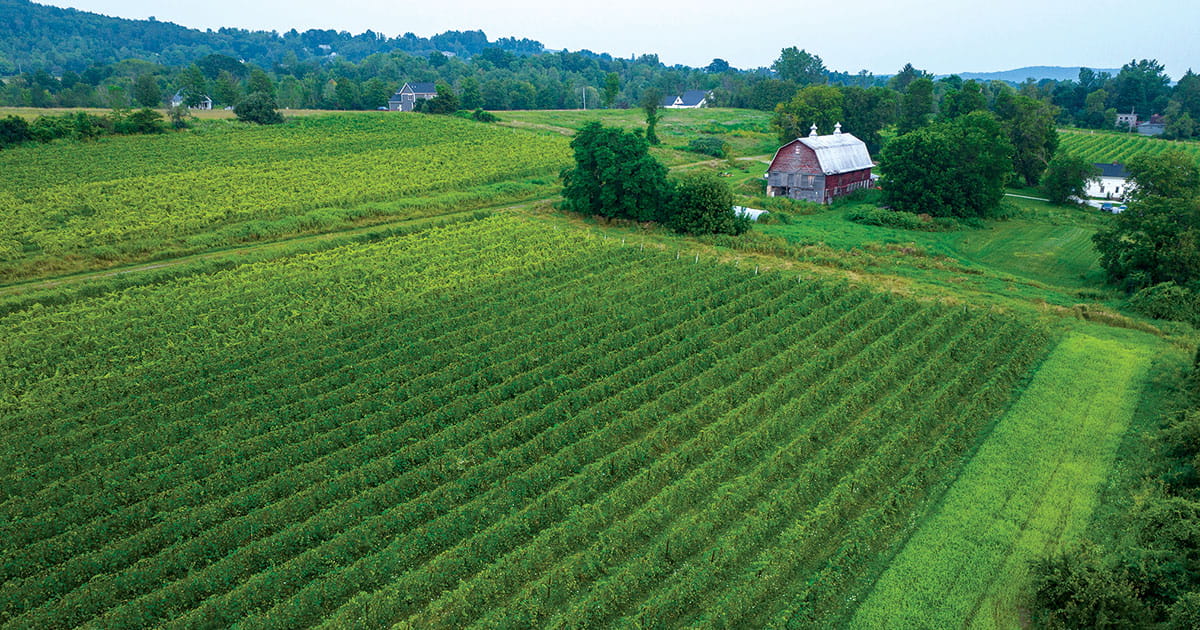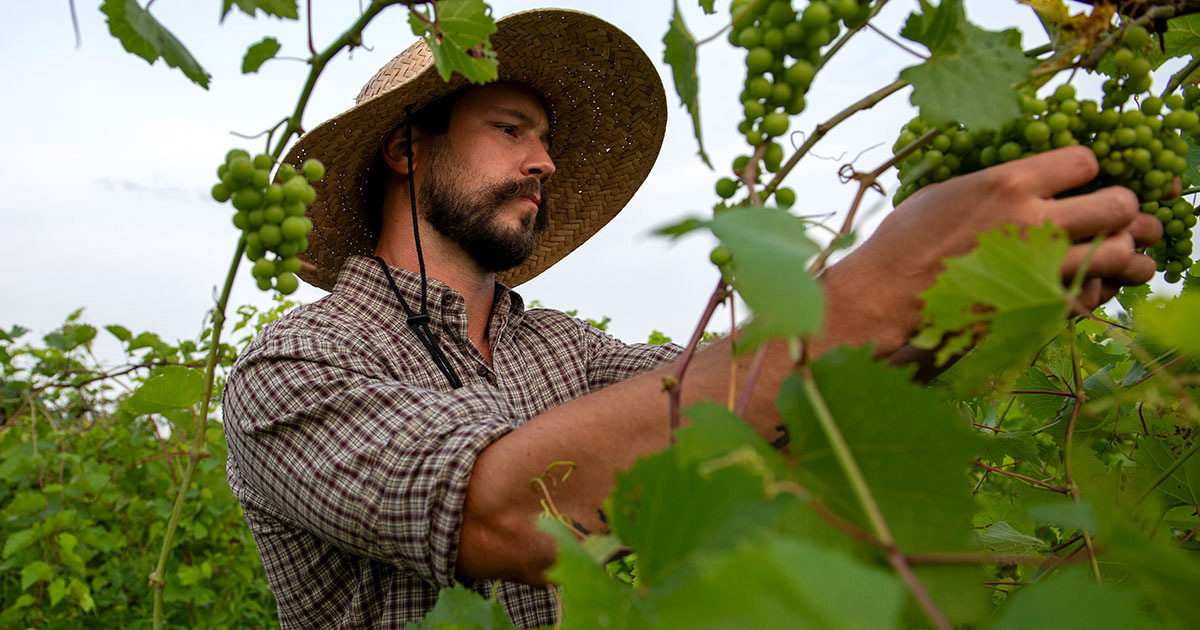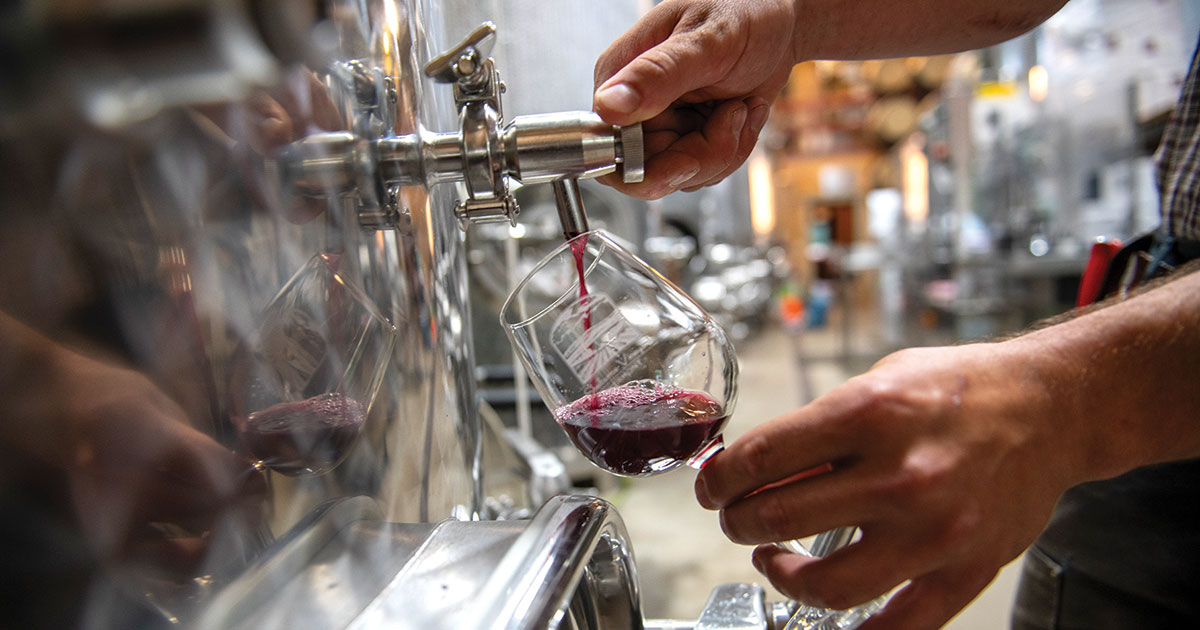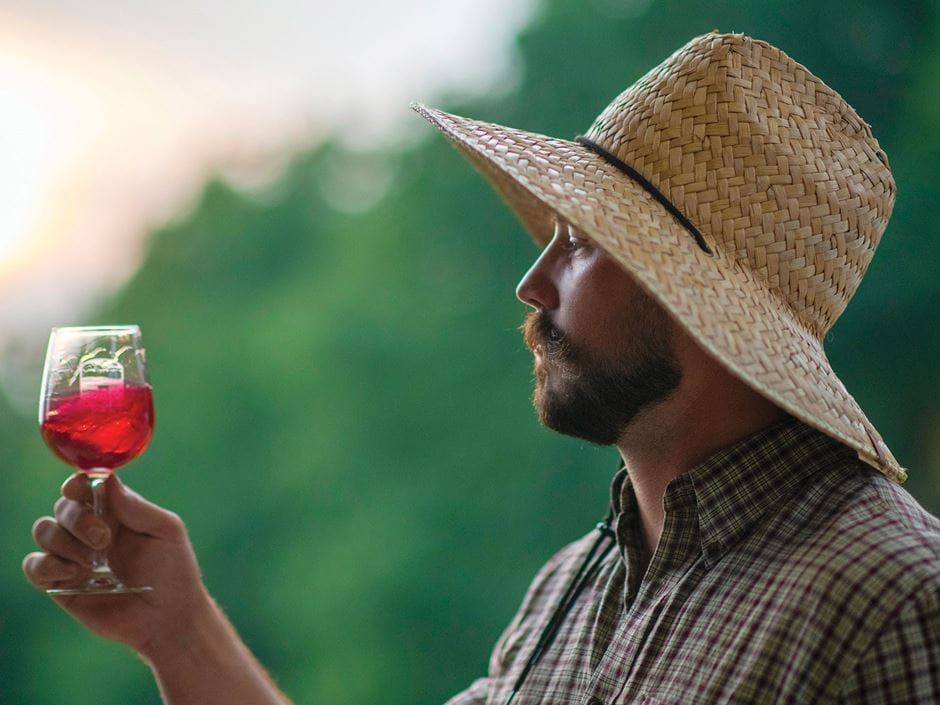Tyler MacKelvey ’15 tells people he’s a farmer when asked about his line of work.
“The wine industry is very glamorized these days,” says the winegrower for Shelburne Vineyard, a prestigious roadside gem dripping with cold-hardy grapes in Vermont’s Champlain Valley, a region renowned for producing the band Phish, brewpubs, and Ben & Jerry’s, and luring throngs of ski-obsessed students to the University of Vermont each year.
But Champlain Valley can now boast wine—good wine—in its repertoire; and thanks to passionate employees like MacKelvey and an ethos centered around preserving the local ecosystem without skimping on quality, Shelburne Vineyard’s star is on the rise in and outside of the Green Mountain state.
Standing in front of rows of La Crescent grapes used to make the winery’s skin contact “orange” wine, MacKelvey examines sun-dappled leaves peppered with holes—recent evidence of Japanese beetles, which he typically flicks away or washes off with a little soapy water. True to the Vermont state motto of freedom and unity, it’s about finding harmony with nature. Live and let live. So, when nature presents challenges at Shelburne Vineyard, nature is often the solution.

“We’re constantly trying to encourage more biodiversity in our vineyards. One of those easy ways to do it is letting in flowers and native pollinators—letting everything have some habitat as a benefit to us and the ecosystem that we work with,” he said.
A few years ago, the vineyard partnered with a local shepherd to use a flock of around 100 sheep to manage undervine weeds in springtime, a critical moment before the summer sun and heat coax to life the succulent fruit that will later become wines like the 2021 Marquette, bursting with berries and just a hint of vanilla, or the light-bodied Petite Pearl, all at once tart and earthy.
Employing sheep reduces labor costs and carbon dioxide output from tractors. Their waste then fertilizes the ground, promoting nutrient cycling. The cycle of life.
So, MacKelvey’s not wrong—he is a farmer.
From biotech to cold climate viniculture
Farming isn’t the occupation the Endicott alum dreamt of for himself.
But growing up in Amherst, N.H., MacKelvey’s playground was the outdoors, and like many New England-born kids, he was practically handed a pair of skis and a snowboard at birth. Even so, hard work was never far off.
“My dad grew up in a family that didn't have a lot of money, so it was very much a do-it-yourself family. He brought a lot of those values to my childhood,” says MacKelvey.
His mother was an educator and his father an engineer and the household handyman, “so I was always encouraged to look into things,” he recalls. “If it’s broken, it was ‘Let’s take it apart.’ ‘Let’s figure out how that works.’ Or, you know, ‘We’re installing an electrical line today—Tyler, you’re going to go dig 50 yards of a two-foot trench.’”
From an early age, MacKelvey also learned to problem-solve and rely on creative thinking to find workarounds and solutions. “That was a lot of what I gleaned from my childhood,” he says.
But his biggest passion was soaring into golden afternoons on a skateboard, feeling that windblown rush of freedom and movement—priceless for a kid. During those sessions, alongside friends and fellow skaters, MacKelvey came to understand skateboarding as more than a sport but a subculture—one with its own set of values and creativity. And, less romantic, an invitation to pain.
“Skateboarding is extremely difficult,” he says. “It’s not something that you just hop on and you’re good at it. It’s decades of falling and hurting and learning and talking to people and figuring things out. But that translates really well into the rest of your life. And that really has translated for me—the perseverance aspect of it. Not being discouraged when something isn’t working out, because skateboarding very often does not work out.”
Perseverance, experimentation, risk-taking—while scouting for colleges, MacKelvey saw a crossover between skating and the sciences, which he was also drawn to. He was always adept at chemistry and math, but coming of age in New Hampshire, MacKelvey originally envisioned himself pursuing environmental sciences.
Only at Endicott did that start to change. MacKelvey wanted to challenge himself academically and personally, and biotechnology—still a nascent industry in the early 2010s—offered a blend of chemistry and microbiology with a promising professional trajectory.
Biotechnology was complex and it was new; the 1000 Genomes Project was just getting sequenced. CRISPR hadn’t yet come online either. So, at internship time, MacKelvey took a gig with the Massachusetts Audubon Society’s Salt Marsh Science Program working with young students to monitor vegetation growth and salinity.
He penned his senior thesis on vermiculture—the study of earthworms and their impact on composting and soil—but by graduation, MacKelvey had no idea where his career was headed, and that was fine. He just wanted to exist in the world for a while, to see what arose organically. And that’s just what happened.
MacKelvey moved to Portsmouth, N.H., after Endicott. Wine wasn’t even on his radar—not as a career anyway. But at a local bottle shop, MacKelvey had a run-in with emergency room doctor Peter Oldak, who was dropping off cases of wine from Jewell Towne Vineyards, Oldak’s side hustle and labor of love.

“He was trying to sell me on it,” recalls MacKelvey, “and I just ended up talking to him about what he was doing. He’s like, ‘Where are you from? What do you do?’ And he’s like, ‘Well, I'm actually looking for somebody.’ It was a very casual conversation.”
Like skating, biotechnology, or working with his father, MacKelvey was never one to shy from a challenge.
“There was a lot of responsibility given to me immediately, which was great. I really don’t mind that steep learning curve, onboarding really quickly,” he says.
Turns out, winemaking was a lot like Endicott: “Just learning how to assess procedures and use a very strict methodology to get from point A to point B and get things done.”
Fermentation—one of the world’s oldest microbiological processes—was new to MacKelvey, even if microbiology wasn’t. He remembers one afternoon as a naive young winemaker opening up a fermenting tank in front of a tour group “without really knowing what I was getting into,” he says.
MacKelvey unwittingly released “a big ’ol blast of CO2” that nearly knocked him unconscious.
But what he didn’t know about winemaking he learned from Oldak, who was one of the early pioneers of New England winemaking and hybrid grape growing. (Oldak closed Jewell Towne Vineyards in 2018 to focus on retirement.) With Oldak’s mentorship, MacKelvey learned the ropes of cold climate viniculture.
“Learning about something super, super specific to the region was really important,” he says. “And I spent a lot of hours at Portsmouth Book & Bar reading just about every book that I could get my hands on about this topic, which was nice because after graduating, and even now, I miss reading scientific literature.”
A taste of Champlain Valley life
MacKelvey eventually moved on to Shelburne Vineyard, which he found by Googling “wineries in New England” and then cold-called one afternoon.
He reached Ethan Joseph, head winegrower and vineyard manager, and the two got to talking. Shelburne Vineyard had just launched Iapetus, a line of unfiltered, unfined, natural wines made using cold-hardy Vermont grapes, and MacKelvey was tasked with field and production work.
Since then, his role has only grown and, this fall, MacKelvey unveiled his own line of wines under the Shelburne Vineyard umbrella called Tempestas. “Mine is made in the natural wine vein,” he says—or, in other words, no commercial yeast. No additives, no fining, no filtering. Nature is the star of the show. It’s also a new creative endeavor for MacKelvey, who oversees all aspects of the wine, from blending to design and photography.
The Tempestas name is a nod to the Roman goddess of weather, which hearkens right back to the tricky Vermont climate and a reminder that wine is made under a unique and sensitive cauldron of factors.
“Champlain Valley has tumultuous weather,” he says. “We get a lot of weather coming across the Adirondacks. Really strong storms.”
During July 2023, Vermont was deluged with storms—some so catastrophic that President Joe Biden issued a disaster declaration for much of the state. While Shelburne Vineyard dodged much of the destruction, a late-season frost had already diminished this year’s crop by 60 percent.

While climate change threatens renowned wine regions across Europe and California, burgeoning wine regions like New England may come into larger recognition and legitimization. Of course, that will likely come at a cost. MacKelvey knows this. Farming is an occupation tied to anxiety, second-guessing, long hours of manual labor, and the drastic whims of weather.
But working in wine has also taught MacKelvey, a lifelong outdoorsman, how to appreciate the natural world all over again. He’s become something of a gourmand, and not only with wine—“Wine, to me, is very much made in the vineyard, and we spend an enormous amount of time making sure that the quality of our grapes is as high as it possibly can be,” he says—but with cooking for pleasure. And, living in Vermont, MacKelvey has a network of local farmers and artisans from whom to shop and inspire him.
Farm life has also reinforced the necessity of community, something MacKelvey first intuited as a kid on a skateboard running with like-minded young whippersnappers. But even as an adult, MacKelvey still seeks to build upon that subculture and skating ethos by appealing to an audience “different and younger than your average wine consumer,” he says. And he’s doing just that by creating wines that are both approachable in price, eye-catching in design, and unique in taste.
More importantly, MacKelvey’s community now also includes several Bhutanese and Nepalese families who were part of a resettlement program sponsored by the state. Many come from agricultural backgrounds and work in the vineyard alongside MacKelvey and their own family members, something unique to both cultures.
“You’ll see a grandfather alongside his son, his wife, and their son,” says MacKelvey. “And although there’s a language barrier, there’s a general understanding of the land.”
Hard work like farming is infinitely more difficult when done alone, so the winemaking Vermont family MacKelvey has cultivated is not only enriching but invaluable.
“It takes a lot of people from a lot of different backgrounds to get things done. That’s why it’s so important to make sure that people support their local food systems and support people growing it. There are a lot of communities that don’t get nearly enough praise for how much work they do to make sure there’s food on the table for everybody.”
Looking out into the vineyard, he muses: “I’m just a small cog in the wheel to grow this fruit.”
